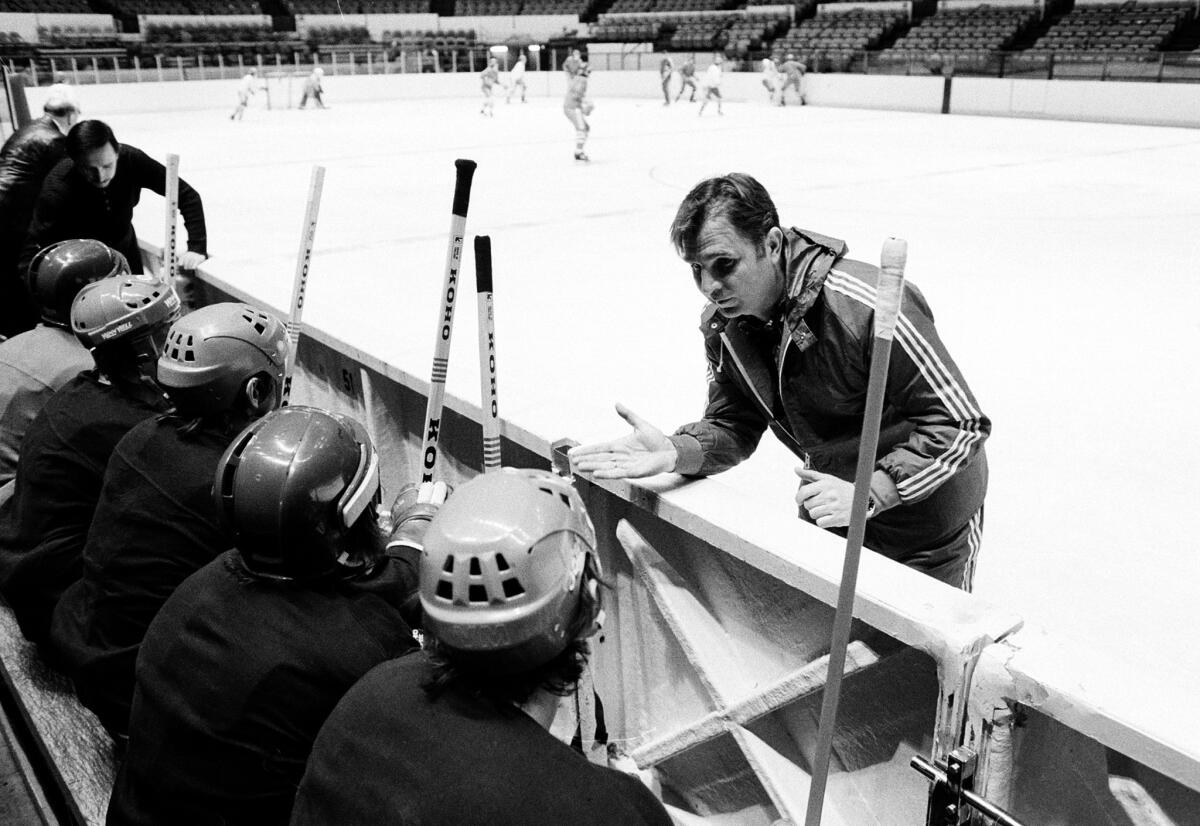Viktor Tikhonov dies at 84; Soviet coach who lost in âMiracle on Iceâ

Viktor Tikhonov, the stern hockey coach who led the Soviet Unionâs âBig Red Machineâ to three Olympic gold medals and eight world championships but was on the losing side when Herb Brooksâ American college kids pulled off the âMiracle on Iceâ at the 1980 Lake Placid Winter Games, died Sunday in Moscow, according to the Russian ice hockey federation. He was 84.
Tikhonovâs son, Vasily, a former assistant coach with the National Hockey Leagueâs San Jose Sharks, died last year as the result of a fall. His grandson, also named Viktor Tikhonov, played briefly for the NHLâs Phoenix Coyotes and represented Russia at the Sochi Olympics earlier this year. The younger Tikhonov currently plays for SKA St. Petersburg in Russiaâs Kontinental Hockey League.
Viktor Tikhonov, a former player and coach of several Soviet club teams, was a tough and exacting taskmaster who was allowed to control his playersâ training and lives nearly year-round as coach of the national team. He helped build the then-Soviet hockey team into a world power, and his reigning world champions were expected to easily win Olympic gold in 1980.
Those expectations were heightened after his team, fueled by its usual discipline and precise passing, routed Team USA, 10-3, in an exhibition game at Madison Square Garden a few weeks before the Lake Placid Games began.
If that caused the Soviets to become arrogant, it fed the Americansâ underdog mentality. And Brooksâ team, built around speed and vigor and motivated by his fiery speeches, surprised the Soviets by competing closely in their medal-round game at Lake Placid.
Everything changed when Mark Johnson scored a goal with one second remaining in the first period to bring the U.S. even at 2-2, and Tikhonov surprisingly responded by pulling stellar goaltender Vladislav Tretiak and replacing him with backup Vladimir Myshkin.
Emboldened by the Sovietsâ apparent confusion and relieved they no longer had to face Tretiak, the Americans went on to earn a 4-3 victory and then defeated Finland for the gold medal. Tikhonovâs team won the silver medal.
U.S. defenseman Ken Morrow told the Chicago Tribune in 2000 that the Americans got a psychological boost from Tikhonovâs decision to switch to the less-experienced Myshkin and bench Tretiak.
âIt was such a shock because he was considered the best goalie in the world at the time,â Morrow said. âThe shocking thing was you never saw that team panic, and it seemed to us like a panic move at that point. They usually just went about their business and nothing changed. But it was a sign that something wasnât right.â
Tikhonov returned to coach the Soviets to Olympic championships in 1984 and 1988. After the breakup of the Soviet Union, he coached its successor, the Unified Team, to gold in 1992.
âThe entire global hockey community has lost a great coach,â Tretiak, who now heads the Russian Hockey Federation, told Russiaâs R-Sport news agency.
âHe devoted his entire life to hockey until the last second. Even when I was with him in hospital, we were discussing what needed to be done and how, in order to raise the Russian national team to the very highest level.â
The Russian Sports Ministry called his death âan irreplaceable lossâ for the sport.
Born June 4, 1930, Tikhonov was a member of the International Ice Hockey Federationâs Hall of Fame, as a builder. Heâs survived by his wife, Tatyana, and several grandchildren.
Twitter: @helenenothelen
More to Read
Start your day right
Sign up for Essential California for the L.A. Times biggest news, features and recommendations in your inbox six days a week.
You may occasionally receive promotional content from the Los Angeles Times.





